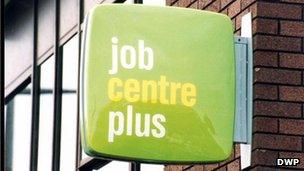PCS union votes for strike action after national ballot
- Published

PCS members include jobcentre, benefits and tax office workers
The UK's largest civil service union has voted for strike action in a row over job losses, pay and pensions.
The Public and Commercial Services Union (PCS) says 61% of those who voted in a national ballot opted to strike. Turnout among the union's 250,000 members balloted was 28%.
The PCS, which wants a 5% pay rise, or £1,200, says potential walkouts could clash with the Budget later this month.
The government said the results of the ballot were "disappointing".
The union, whose members include job centre, benefits and tax office workers, said its national executive committee will decide the exact nature of the action on Wednesday.
A Cabinet Office spokesman said: "It is disappointing that yet again the PCS insist on pushing for futile action which benefits no-one, and damages the services they deliver to the public.
"The result from today's ballot shows that the PCS leadership couldn't even convince large swathes of its own membership of the benefits of walkouts."
Economy 'flatlined'
The low turnout could weaken the union's bargaining power with the government, but a PCS spokesman said: "No one wants to see low turnouts, but government ministers and their supporters are content that police and crime commissioners have a mandate on a 15% turnout, so it would be rank hypocrisy for them to say otherwise about our ballot."
Of those who voted, 80% were in favour of forms of industrial action other than striking.
The Cabinet Office spokesman added: "The government took the tough decision to freeze public sector pay for two years, while protecting those earning under £21,000 by increasing their pay by at least £250 per year.
"Pay restraint has helped to protect jobs in the public sector and support high quality public services."
The union is demanding the government scrap plans to cut pensions and change its terms and conditions.
PCS general secretary Mark Serwotka said: "Civil and public servants are working harder than ever to provide the services we all rely on but, instead of rewarding them, the government is cutting their pay, raiding their pensions and trying to rip up their basic working conditions.
"We said more than two years ago that austerity wouldn't work and we have been proved right. Under this Tory-led government, our economy has flatlined, we are heading for a triple dip recession and the chancellor has lost his prized AAA credit rating.
"We urgently need to invest our way out of recession, with an end to the economically disastrous pay freeze and job cuts and with a serious clampdown on tax avoidance and evasion."
Last week, local government employers tabled two pay offers which could end the three-year pay freeze covering 1.6 million council workers in England, Wales and Northern Ireland.
The offers included a below-inflation pay rise of 1% tied to several conditions or a separate offer of 1% for staff - with a 0.6% rise for those on higher grades.
But the largest public sector union Unison, which says it represents 600,000 local government employees, has recommended that its members reject both options and is consulting over industrial action.
- Published28 February 2013